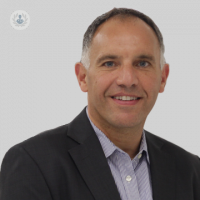Navigating AI in child and adolescent mental health
Written by:AI has undoubtedly started to have an impact on all aspects of healthcare, including mental health for children and adolescents. Forbes.com recently wrote about how AI in mental health is emerging as a reassuring resource for diagnosis, developing therapies and enabling a more personalised approach and treatments for patients.
However, there are various aspects to consider such as ensuring collaboration between AI and human-led care leads to the best results for patients. Leading consultant child and adolescent psychiatrist Dr Jon Goldin takes a comprehensive look at AI in child and adolescent mental health in this article, written with the help of AI.

How does AI contribute to the diagnosis of mental health conditions in young individuals?
Understanding the role of Artificial Intelligence (AI) in mental health diagnosis is crucial.
AI-assisted assessment
AI can collaborate with clinicians to enhance data analysis during assessments. This aids in improving the identification and understanding of mental health conditions in children and adolescents.
Objective insights
The integration of AI can help to introduce objectivity into evaluations, potentially ensuring a more standardised assessment of behavioural and emotional patterns.
How can AI enhance treatment approaches for young people?
AI has the potential to introduce significant opportunities to improve mental health care for the younger population:
Tailored treatment plans
AI analyses genetics, lifestyle, and treatment responses to craft personalised plans. This contributes to more effective and targeted interventions.
Digital therapeutics
The implementation of AI introduces novel treatment avenues with cognitive-behavioural therapy principles and interactive exercises through mobile apps.
What opportunities does AI present in improving child and adolescent mental health care?
AI introduces significant opportunities to improve mental health care for the younger population:
Proactive intervention
AI contributes to early intervention by predicting conditions based on historical data. This allows for timely and targeted support, potentially mitigating mental health challenges.
Remote access
Mental health services are able to reach patients living in remote areas through AI-driven solutions. Virtual platforms and online interventions bridge geographical gaps, providing support to those with limited access.
What concerns should parents and caregivers be mindful of regarding AI in mental health for young individuals?
While AI in mental health holds promise, it's essential to be aware of potential concerns:
Ethical considerations
Safeguarding privacy and obtaining informed consent are crucial ethical considerations. Responsible handling of sensitive information must be a priority.
Data accuracy
The efficacy of AI relies on the quality of processed data. Diverse and representative datasets are vital to prevent biases in algorithms.
Supplementing human interaction
AI should complement, not replace, human connection. The pivotal role of parents, caregivers, and mental health professionals in providing emotional support remains irreplaceable. The sensitivity, understanding and empathy of a human being cannot be replaced by AI.
How can parents and caregivers navigate the integration of AI in child and adolescent mental health?
Ensuring seamless integration involves:
Informed decision-making
Engage in informed discussions with mental health professionals about AI integration.
Open communication
Maintain open communication with your child's mental health team. Discuss any concerns or questions regarding the potential use of AI, working collaboratively to create a holistic approach to well-being.
What is the outlook for AI in mental health for children and adolescents?
As AI is likely to increasingly shape child and adolescent mental health care, being informed empowers parents and caregivers to make the best decisions for their children. The collaborative integration of AI and human care can lead to a more comprehensive and effective approach to mental well-being.
Concerned about your child or adolescent’s mental health? Arrange a psychiatric consultation with Dr Goldin via his Top Doctors profile.


